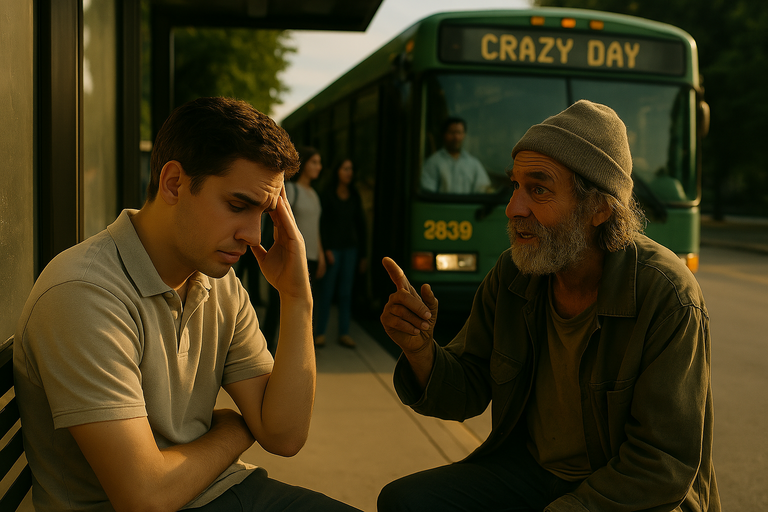Anoche me encontré con un loco (así le decía la gente, y así lo llamé yo). Aunque su apodo parecía inadecuado, el hombre hablaba muy cuerdo, palabras locuaces, total coherencia, gran intelecto. Esperábamos juntos la guagua y yo me ofrecí a darle de comer, lo rechazó sin muchas palabras y con elocuencia, sin enojo u orgullo, como cansado de tal ofrecimiento.

Imagen creada en Microsoft Copilot
Mientras esperabamos la guagua intente mediar palabra, tal vez mi curiosidad o mi espíritu sociable fue el motivo. Con voz serena, me contó de su familia y de su trabajo, de cómo todos lo abandonaron en el momento en que empezó a ver las cosas tal como realmente eran. Confesó que se había rendido a cambiar la locura del mundo y que habia apredido a llamarse loco, si eso era ver lo que el veia.
"Muchacho, esa ignorancia te va a matar de una forma que no imaginas.” No lo entendí, él tampoco esperaba que lo hiciera.
“¿Ves esos cuerpos? ¿A esas personas disimulando hablar? En realidad no saben lo que dicen, no saben que les han quitado al alma. Esa chica, que ves sentada, triste, se levanta cada día y ve en el espejo una sonrisa aunque ella no la muestre. ¿Acaso los padres creen a los niños cuando dicen que hay mountruo bajo su cama? No, los ignoran, los ignoran. Es ignorancia, te va a matar.”
Legó la guagua. El loco se levantó, subió sin pagar, le sonrío chofer quien le devolvió el gesto mientras le preguntaba que tal el día
"Un día de locos.”
Yo me quedé sentado, pensando en cual de los 2 tenia razón. El loco, no, mejor dicho, el lúcido o yo, un necio inepto que se cree cuerdo.
Nota traducido por Microsoft Copilot
ENGLISH
Last night, I met a madman (that’s what people called him, and so did I). Yet, despite his nickname seeming ill-fitting, the man spoke with remarkable lucidity, as if his words carried a truth that few dared to acknowledge. We waited together for the bus, and I offered him some food. He refused without many words, but with eloquence—neither anger nor pride, simply the weariness of such an offer.
While we waited, I tried to strike up a conversation—perhaps out of curiosity or because of my naturally sociable spirit. In a calm voice, he told me about his family and his work, how everyone had abandoned him the moment he began seeing things for what they truly were. He confessed that he had given up trying to change the madness of the world and had learned to call himself insane—if that was what it meant to see things as he did.
"Boy, ignorance—it will kill you in ways you can't imagine." I didn't understand. He didn’t expect me to.
"Do you see those bodies? Those people pretending to talk? They don’t really know what they’re saying; they don’t realize that their souls have been taken. That girl, sitting there, sad—she wakes up every day and sees a smile in the mirror, even though she doesn’t wear one herself. Do parents believe their children when they say there’s a monster under their bed? No, they ignore them. They ignore them. Ignorance—it will kill you."
The bus arrived. The madman stood, stepped on without paying, and smiled at the driver, who returned the gesture while asking how his day had been.
"A crazy day."
I remained seated, wondering which of us was right—the madman, no, better said, the lucid one—or me, a foolish, inept man who believes himself sane.

